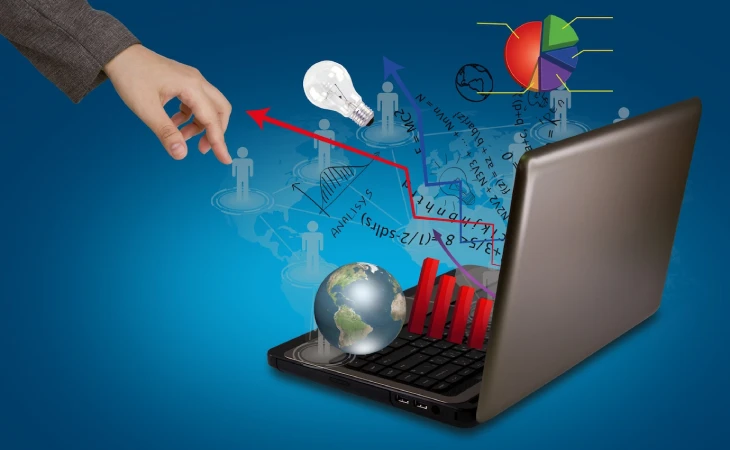Technological progress has completely transformed the logistics sector in the US. The advancement has helped firms to stand out in the highly evolving and competitive US market. Logistics firms can function more efficiently and improve productivity.
New improvements allow logistics companies to streamline operations, work better, and provide excellent customer experiences. These advancements have opened up new possibilities and ways of doing things in the logistics industry.
By embracing these technological innovations, logistic companies can keep up with the competition and stay ahead in the US market. It’s all about utilizing the latest tools and techniques to optimize operations and provide top-notch service.
Emerging Technologies Changing in Logistics Landscape
In today’s fast-changing world, technology is greatly changing the logistics industry. These emerging advancements are changing how we move, store, and handle goods and services. By using these latest trends, firms can gain an advantage in the dynamic US market.
- Artificial Intelligence
In logistics, AI technology improves decision-making. It uses machine learning algorithms to analyze data and make operations more efficient. It optimizes routes, predicts demand, and streamlines the supply chain. AI chatbots offer instant customer support, and help solve problems quickly in real-time.
- Blockchain
Blockchain technology helps make transactions in the supply chain secure and transparent. Smart contracts automate agreements. It reduces the dependence on middlemen and builds trust. Systems based on blockchain ensure complete traceability. They help minimize the risks of fraud and counterfeiting.
- IoT (Internet of Things)
IoT devices, like sensors and RFID in warehousing, allow firms to track and monitor goods in real time. Connected devices help them to manage inventory better. They prevent stock shortages and improve visibility in the supply chain. Analytics powered by IoT provides automated warehousing solutions. Moreover, they cut costs and increase efficiency.
- Robots and Automation
Robotic systems automate repetitive tasks, such as picking, packing, and sorting. Robots can do repetitive tasks like picking, packing, and sorting. Self-driving vehicles and drones help with quick deliveries and managing inventory. Robotic process automation (RPA) makes administrative tasks easier and more accurate.
- Data Standard and Advanced Analytics
Making data formats and protocols standard helps different parts of the supply chain. They make the process smooth and allow better communication. Tools that smartly analyze data improve operations and predict demand. They also allocate resources better. Predictive analytics helps reduce risks, avoid downtime, and make customers happier.
- Drone Technology
Drones provide new and clever ways to make deliveries faster and cheaper. They can go to faraway places and help in emergencies during disasters. Drone technology makes inventory audits and inspections faster and more efficient. By adopting these new trends, the logistics company can enjoy many advantages. The trend allows better efficiency and lower costs. They also improve customer satisfaction and create a positive impact on the environment.
How Technology Helps Logistics Companies Gain the Competitive Edge?
Logistics is important for businesses to run smoothly. They satisfy customers in today’s ever-changing business world. Technology has significantly changed the logistics industry, helping businesses gain an advantage in the US market. Here is how strengthening your technology game will strengthen your business:
- Enhanced Supply Chain Visibility
Real-time tracking and monitoring systems help businesses see everything in their supply chain. GPS and RFID technologies allow accurate tracking of shipments. They make things work better and lower the chance of loss or delays. It helps the logistics company solve problems and remove obstacles in the supply chain. It results in quicker and more dependable deliveries.
- Efficient Logistics Management
Smart inventory systems use automation and data analysis to improve productivity in modern times. They manage stock efficiently and avoid having too much or too little. Logistics companies can predict demand accurately, streamline procurement, and lower storage expenses. Using technology-driven logistics management, firms ensure they have the right products in stock when needed. It reduces wait times for customers and improves their satisfaction.
- Automation and Robotics
In warehouses, automation, and robotics technologies make things easier. They help with tasks, reduce manual work, and make operations more efficient. Faster order processing and fewer mistakes happen with automated picking and sorting systems. Robotics helps manage inventory faster and more accurately. It counts and restocks inventory with improved speed and precision.
- Data-Driven Decision Making
Analytics and big data technologies help firms understand and improve logistics operations. They analyze past data, find patterns and plan better routes. Additionally, they make transportation more efficient. Using data to make decisions allows firms to be proactive. They solve problems, save money, and improve overall efficiency.
- Last-Mile Delivery Innovations
Technological progress has changed the final stage of logistics as well. It is called last-mile delivery. This phase is vital yet difficult to manage. It optimizes delivery routes to reduce the time and fuel required for deliveries focusing on saving costs.
Wrapping up,
Technology is essential for logistics companies to gain a competitive edge in the US market. By using innovative solutions, businesses can make their operations smoother. They can become more efficient and provide better experiences for customers. Innovation offers various tools. It includes automated warehouses and real-time tracking. Analytics improve supply chains.
Businesses can benefit from using these advancements. They allow firms to save money, avoid errors, and improve productivity. Moreover, integrating AI, IoT, and blockchain in logistics offers better visibility. They increase transparency and security in the supply chain.
Logistics firms need to welcome and adjust to these technological advancements to thrive in the ever-changing US market. These advancements are key to discovering fresh opportunities and maintaining a competitive edge over rivals.
If you are looking for skilled developers to integrate smart technologies into your logistics business operations, Think Smart has the best and most skilled developers to meet your expectation. With our staff augmentation service, you can hire the best talents at minimal costs. Visit our website today to learn what services we offer to our clients!

